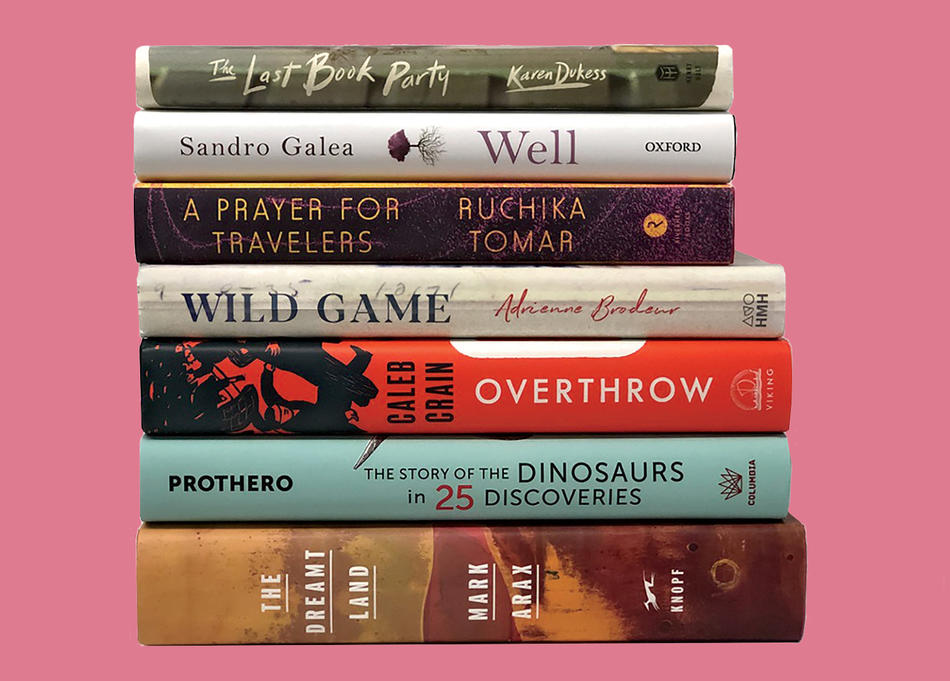The Last Book Party
By Karen Dukess ’87JRN
It’s the summer of 1987 — a time when book publishers still took three-martini lunches and threw lavish launch parties. In Karen Dukess’s charming debut novel, we see this world through the eyes of Eve Rosen, a floundering editorial assistant who takes a job on Cape Cod as the research assistant to a famed New Yorker writer and finds herself entangled in a complicated web of romantic relationships. Dukess herself worked at Little, Brown in the eighties before becoming a newspaper reporter and then a speechwriter for the UN — and her novel is brimming with nostalgia for an era when authors were celebrities and books were beloved
Well
By Sandro Galea ’03PH
There is perhaps no more urgent topic in America today than health care. But according to physician Sandro Galea, dean of Boston University’s school of public health, the American approach to public health is fundamentally skewed. Galea argues that our health-care system is almost entirely focused on treating illness rather than preventing it, which means that America spends more on health care than other countries, while getting worse results. It’s an impeccably researched, well-reasoned look at a complex topic.
A Prayer for Travelers
By Ruchika Tomar ’12SOA
Cale Lambert is used to people disappearing from her life. Her own mother abandoned her when she was a baby, leaving her to be raised by her grandfather in a tiny California desert town. And as Ruchika Tomar’s moody, tense debut novel begins, the teenage Cale’s life is being upended again. Her best friend Penny has gone missing, and Cale goes on a journey to find her, uncovering troubling secrets along the way.
Wild Game
By Adrienne Brodeur ’88CC
For Adrienne Brodeur, summers meant bike rides on Cape Cod, lobster dinners on the beach, and — starting when she was fourteen years old — helping her mother, Malabar, cover up a passionate extramarital affair. Malabar’s lover, Ben, was her husband’s best friend, and the author’s involvement in the situation got even more complicated when she fell in love with, and eventually married, Ben’s son Jack. Brodeur’s dramatic story makes for a perfect beach read; the fact that the soap opera is true makes it all the more compelling.
Overthrow
By Caleb Crain ’99GSAS
This inventive, intensely political second novel from Caleb Crain follows Matthew, a bored graduate student who becomes entangled with Leif, a young Occupy Wall Street activist (and also a street poet and barista). But Leif, who espouses radical empathy, isn’t just protesting in the conventional way. He believes that he can use psychic powers and occult weapons to infiltrate — and eventually overthrow — the 1 percent. Crain’s premise is a bit out there, but his book is an interesting commentary on the very real modern issues of privacy and surveillance.
The Story of the Dinosaurs in 25 Discoveries
By Donald R. Prothero ’82GSAS
Most grade schoolers could probably tell you that the triceratops has three horns and that the velociraptor was an ancestor of modern birds. But what they might not know is how humans managed to learn so much about the creatures that roamed the earth millions of years ago. In his latest book, paleontologist Donald Prothero takes us behind the scenes of twenty-five major fossil finds and explains how they shaped our understanding of these ancient beasts.
The Dreamt Land
By Mark Arax ’81JRN
It’s easy to imagine California as one long stretch of coastline. But as journalist Mark Arax reminds us, most of the state is actually inland — a seemingly endless expanse of farmland with a very complicated relationship to one vital resource: water. Arax comes from a long line of Central Valley farmers, so California’s history with water, or as Arax calls it, “liquid gold,” is a very personal one. His stunning book weaves together memoir, reportage, and exhaustive research to explain how Californians built an agricultural empire out of an arid land and what the future holds for his beloved state.



